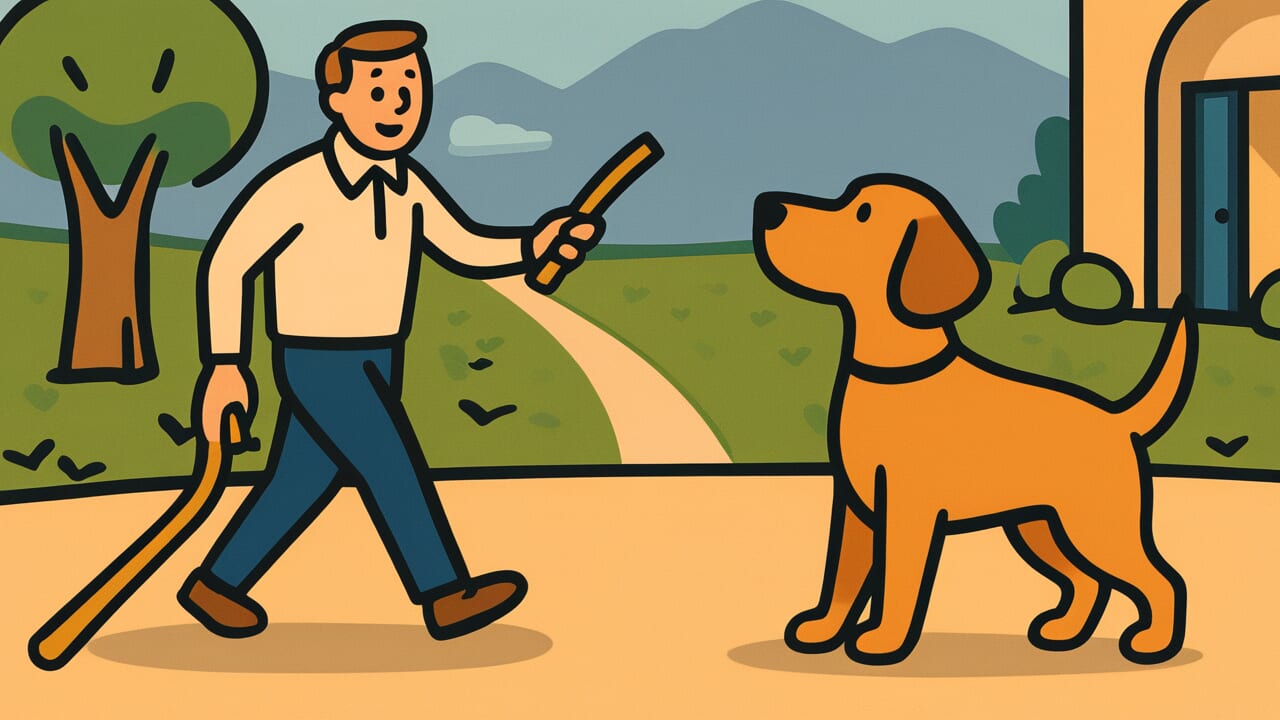How to Read “Raising a stick to call a dog”
Tsue wo agete inu wo yobu
Meaning of “Raising a stick to call a dog”
“Raising a stick to call a dog” means that seeking closeness with an intimidating attitude will backfire.
It describes the contradictory action of raising a stick as if about to strike while simultaneously trying to call a dog closer.
This proverb applies to situations where attitude and purpose contradict each other.
For example, a boss who takes an overbearing attitude while trying to gain trust from subordinates.
Or a parent who scolds a child harshly while hoping the child will open up emotionally.
The teaching is clear: if you want to close the distance with someone or become closer to them, you must take an appropriate attitude.
Otherwise, you won’t get the results you want.
Even in modern society, people who wield authority while seeking popularity are not uncommon.
The same goes for those who throw harsh words while expecting goodwill in return.
This proverb succinctly expresses the foolishness of such contradictory behavior.
Origin and Etymology
The exact source of this proverb is unclear.
However, based on its structure, it likely arose from observing the relationship between people and dogs.
Dogs have been one of the animals closest to humans since ancient times.
Anyone who has owned a dog knows they react sensitively to human attitudes and gestures.
If you gently extend your hand, a dog will happily approach.
But if you raise a stick or pole in a threatening motion, the dog will become wary and run away.
In some cases, it might even become aggressive.
This proverb was probably born from this natural observation.
Raising a stick is an intimidating action that signals an intention to strike.
Yet calling the dog at the same time creates a contradiction that perfectly symbolizes self-contradiction.
The same applies to human relationships.
You want someone to come closer and become friendly, yet your attitude is overbearing and intimidating.
This proverb teaches that such contradictory behavior doesn’t work on dogs or humans.
Through the everyday behavior of dogs, we can feel the wisdom of our ancestors who saw through the essence of human relationships.
Usage Examples
- The new leader only says harsh things and expects subordinates to admire him—that’s like raising a stick to call a dog
- That teacher yells at students and then tells them to come for advice, but that’s exactly what raising a stick to call a dog means
Universal Wisdom
The proverb “Raising a stick to call a dog” sharply points out a fundamental contradiction in human relationships.
Why do people take intimidating attitudes while wishing others would come closer?
Behind this lies complex human psychology.
The defensive instinct to show authority, protect one’s position, and avoid showing weakness conflicts with the simultaneous desire for intimacy.
People in positions of power especially may misunderstand kindness as weakness.
They mistakenly believe that strictness alone generates respect.
However, this proverb has been passed down through generations because our ancestors saw through this fundamental error.
Trust and affection never arise from fear.
This is an essential truth about human nature that doesn’t change with time or culture.
Through the behavior of dogs, a familiar animal, this proverb teaches a universal truth.
If you want something from someone, first examine your own attitude.
The wisdom condensed here is that matching purpose with method is the foundation of all human relationships.
When AI Hears This
The moment a stick is raised, a dog feels the fear of being hit more than twice as strongly as the joy of being called.
This is exactly the same structure as the human judgment error proven by prospect theory in behavioral economics.
According to research by Kahneman and Tversky, people feel the pain of losing 100 yen about 2.5 times more strongly than the joy of gaining 100 yen.
In other words, for the same amount, the psychological impact of loss is overwhelmingly greater.
For dogs, when weighing the reward of approaching their owner against the pain of being hit with a stick, the memory of pain completely outweighs the expectation of reward.
What’s interesting is that raising a stick is originally a neutral action.
It might be a signal to call, or simply repositioning the stick.
However, once a dog has been hit with a stick even once, its brain enters “loss avoidance mode.”
It prioritizes the worst-case scenario among all possibilities.
Humans are exactly the same.
When called by a boss, we think “I might get scolded” before “I might get praised.”
When an email reply is late, we worry “Are they angry?” rather than “They’re just busy.”
This proverb has understood for 2,000 years how the brain’s tendency to overestimate losses interferes with rational judgment.
Lessons for Today
What this proverb teaches modern people is the importance of matching purpose with method.
If you want to build a good relationship with someone, you need to take an attitude appropriate to that purpose.
In modern society, positions and roles are complexly intertwined.
We sometimes end up seeking both authority and friendliness at the same time.
As a boss, I want to be strict, but I also want subordinates to like me.
As a parent, I want to teach discipline, but I also want my child to open their heart.
Many people struggle with such conflicts.
However, this proverb teaches us clearly.
If you want someone to open their heart, first open your own heart.
If you want to gain trust, first show an attitude worthy of trust.
That’s not weakness—it’s true strength.
Starting today, reflect on whether your attitude matches your purpose.
Check if what you’re asking from others contradicts the message you’re sending.
That small awareness will be the first step toward greatly changing your relationships.



Comments